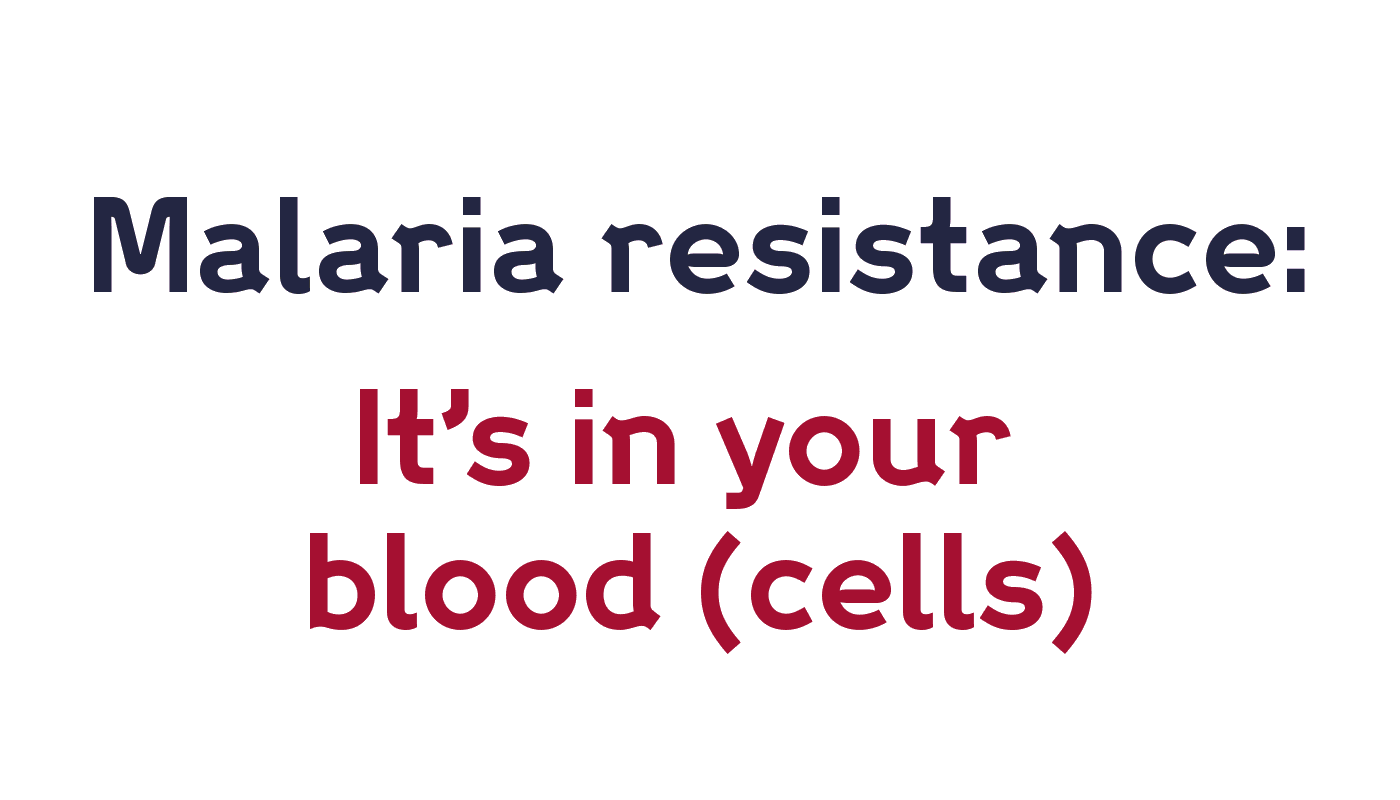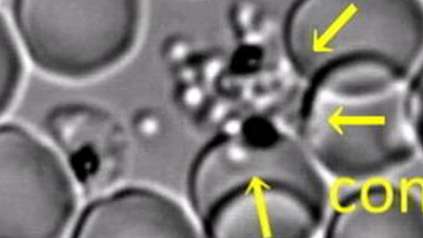How Dantu blood group protects against malaria - and how all humans could benefit
The secret of how the Dantu genetic blood variant helps to protect against malaria has been revealed for the first time by scientists at the Wellcome Sanger Institute, the University of Cambridge and the KEMRI-Wellcome Trust Research Programme, Kenya. The team found that red blood cells in people with the rare Dantu blood variant have a higher surface tension that prevents them from being invaded by the world’s deadliest malaria parasite, Plasmodium falciparum.

The findings, published today (16 September) in Nature, could also be significant in the wider battle against malaria. Because the surface tension of human red blood cells increases as they age, it may be possible to design drugs that imitate this natural process to prevent malaria infection or reduce its severity.
Malaria remains a major global health problem causing an estimated 435,000 deaths per year, with 61 per cent occurring in children under five years of age. P. falciparum is responsible for the deadliest form of malaria and is particularly prevalent in Africa, accounting for 99.7 per cent of African malaria cases and 93 per cent of global malaria deaths in 2017*.
In 2017, researchers discovered that the rare Dantu blood variant, which is found regularly only in parts of East Africa, provides some degree of protection against severe malaria**. The intention behind this new study was to explain why.
Red blood cell samples were collected from 42 healthy children in Kilifi, Kenya, who had either one, two or zero copies of the Dantu gene. The researchers then observed the ability of parasites to invade the cells in the laboratory, using multiple tools including time-lapse video microscopy to identify the specific step at which invasion was impaired.
Analysis of the characteristics of the red blood cell samples indicated that the Dantu variant created cells with a higher surface tension – like a drum with a tighter skin. At a certain tension, malaria parasites were no longer able to enter the cell, halting their lifecycle and preventing their ability to multiply in the blood.
“Malaria parasites utilise a specific ‘lock-and-key’ mechanism to infiltrate human red blood cells. When we set out to explain how the Dantu variant protects against these parasites, we expected to find subtle changes in the way this molecular mechanism works, but the answer turned out to be much more fundamental. The Dantu variant actually slightly increases the tension of the red blood cell surface. It’s like the parasite still has the key to the lock, but the door is too heavy for it to open.”
Dr Silvia Kariuki, of the KEMRI-Wellcome Trust Research Programme, Kenya
The Dantu blood group has a novel ‘chimeric’ protein that is expressed on the surface of red blood cells, and alters the balance of other surface proteins***. In Kilifi, a town on the Kenyan coast, 10 per cent of the population have one copy of the Dantu gene, which confers up to 40 per cent protection against malaria. One per cent of the population have two copies, conferring up to 70 per cent protection. By contrast, the best malaria vaccines currently provide 35 per cent protection.
Because humans have evolved alongside malaria for tens of thousands of years, some people in the worst affected areas have developed genetic resistance to the disease. The most famous example is sickle cell trait, which confers 80 per cent resistance to malaria, but can cause serious illness in those with two copies of the gene. There is currently no evidence that the Dantu variant is accompanied by other health complications.
“The fact that we see the most protective adaptations in areas where malaria is most prevalent tells us a lot about how these parasites have influenced human evolution. Malaria is still an incredibly destructive disease, but evolutionary adaptations like sickle cell trait and the Dantu variant may partially explain why the mortality rate is much lower than the rate of infection. We’ve been fighting malaria parasites for as long as we’ve been human, so there may be other adaptations and mechanisms yet to be discovered.”
Dr Alejandro Marin-Menendez, of the Wellcome Sanger Institute
Researchers suggest one of the most significant implications of the study stems from the fact that the surface tension of human red blood cells varies naturally, generally increasing during their approximately 90-day lifespan. This means a proportion of all of our red blood cells are naturally resistant to infection by malaria parasites, and it may be possible to develop drugs that take advantage of this process.
“The explanation for how Dantu protects against malaria is potentially very important. The red cell membrane only needs to be slightly more tense than usual to block malaria parasites from entering. Developing a drug that emulates this increased tension could be a simple but effective way to prevent or treat malaria. This would depend on the increase in cell tension not having unintended consequences, of course. But evidence from the natural protection already seen in Dantu people, who don’t seem to suffer negative side effects, is promising.”
Dr Viola Introini, of the University of Cambridge
More information
*For more information on these figures and the state of malaria in general, see the WHO World Malaria Report 2018 https://www.who.int/malaria/publications/world-malaria-report-2018/report/en/
** Further details of this study are available here: https://www.sanger.ac.uk/news_item/natural-resistance-malaria-linked-variation-human-red-blood-cell-receptors/
*** A chimeric gene is created when portions of DNA from two genes merge into one. Because the genes are related to each other, there is the potential for their DNA to be rearranged during recombination.
Publication:
Silvia N. Kariuki, Alejandro Marin-Menendez and Viola Introini et al. (2020). Red blood cell tension protects against severe malaria in the Dantu blood group. Nature. DOI: https://doi.org/10.1038/s41586-020-2726-6
Funding:
This research was supported by Wellcome and the Engineering and Physical Sciences Research Council (EPSRC).
Selected websites
KEMRI-Wellcome Trust Research Programme
About the University of Cambridge
The mission of the University of Cambridge is to contribute to society through the pursuit of education, learning and research at the highest international levels of excellence. To date, 107 affiliates of the University have won the Nobel Prize.
Founded in 1209, the University comprises 31 autonomous Colleges, which admit undergraduates and provide small-group tuition, and 150 departments, faculties and institutions. Cambridge is a global university. Its 19,000 student body includes 3,700 international students from 120 countries. Cambridge researchers collaborate with colleagues worldwide, and the University has established larger-scale partnerships in Asia, Africa and America.
The University sits at the heart of the ‘Cambridge cluster’, which employs 60,000 people and has in excess of £12 billion in turnover generated annually by the 4,700 knowledge-intensive firms in and around the city. The city publishes 341 patents per 100,000 residents. www.cam.ac.uk
The Wellcome Sanger Institute
The Wellcome Sanger Institute is a world leading genomics research centre. We undertake large-scale research that forms the foundations of knowledge in biology and medicine. We are open and collaborative; our data, results, tools and technologies are shared across the globe to advance science. Our ambition is vast – we take on projects that are not possible anywhere else. We use the power of genome sequencing to understand and harness the information in DNA. Funded by Wellcome, we have the freedom and support to push the boundaries of genomics. Our findings are used to improve health and to understand life on Earth. Find out more at www.sanger.ac.uk or follow us on Twitter, Facebook, LinkedIn and on our Blog.
About Wellcome
Wellcome exists to improve health by helping great ideas to thrive. We support researchers, we take on big health challenges, we campaign for better science, and we help everyone get involved with science and health research. We are a politically and financially independent foundation. https://wellcome.org



